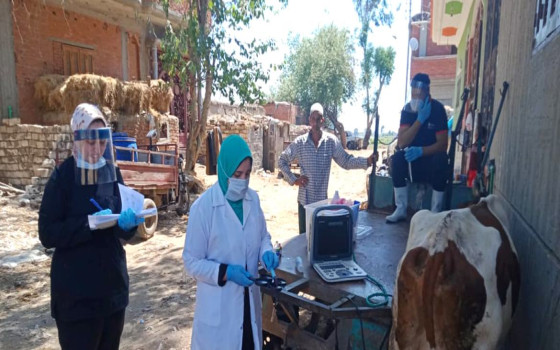
Rawabet project to develop the dairy sector in Egypt, supported by the International Labor Organization

- Europe and Arabs
- Thursday , 28 September 2023 13:19 PM GMT
New York - Cairo: Europe and the Arabs
The Rawabet project is a living embodiment of benefiting from the expertise and experience of the International Labor Organization with local and international partners in promoting decent work in the rural economy.
According to what was stated in a report included in the daily news bulletin of the United Nations, a copy of which we received this morning, Thursday, “The (Rawabet) project to employ Egyptian youth, create job opportunities, and develop the private sector aims to benefit from the expertise and experience of the International Labor Organization in promoting decent work in the rural economy, and to build on Previous initiatives focused on the countryside in Egypt and other countries.
This project is implemented in partnership with several entities, including the International Labor Organization in Egypt and a number of ministries, government agencies, and financial and non-financial service providers, with support from the Norwegian government.
A report published by the United Nations website sheds light on what the Links Project provided to small farmers and dairy producers, and stated:
The Rabet project targets men and women in rural communities, owners of medium, small and micro enterprises and providers of business development and financial services. The project operates in three sectors: dairy, home appliances, and ready-made clothing.
The dairy value chain sector/chain in the Delta region of Egypt, specifically in Gharbia Governorate, was chosen to develop the contribution of all actors to develop a sustainable system that enables all parties to the production process to add value and achieve fair gains. The opinions of some participants in the project were stated in the report, including:
"We have changed. Before the training, we were one thing, and after it we became something else. For example, before the training, there was a lot of information that I did not know, such as cleansing the udder of cattle so that it produces large quantities of milk."
“I received lectures on proper nutrition, and I also followed lectures from veterinarians related to information that if I had known before, I would not have fallen into the problems that I suffered greatly from and that affected the livestock’s milk production.”
“The training we received in the project increased dairy production, and thus my husband and I’s income increased, which helped us a lot to cope with the burdens of life.”
“I was eagerly following my mother’s talk about the Rawabet project, and I was proud that we have such a project in our country that serves farmers, their families, and the surrounding community.”
As for Muhammad Ghoneim, the owner of a dairy collection center in Gharbia Governorate, he believes that the services provided by the project contributed to improving the quality of dairy production:
"I am part of the value chain in the project. I receive milk from small farmers, then I assemble it and deliver it to the factory, which in turn delivers the final product to the consumer. I value the services provided by the project, which helped increase the efficiency and productivity of milk."
Egyptian Minister of International Cooperation, Dr. Rania Al-Mashat, says that the “Rawabat” project is a very good example of the ILO’s commitment to the “Decent Life” presidential initiative to build capacity and strengthen links between key actors, including small producers and farmers, by improving their competitiveness and working conditions, supporting their livelihoods, and enhancing Rural development in general, and the Minister went on to say:
“We are happy today to be in Gharbia Governorate to inspect the Rawabet project, which embodies our partnership with the United Nations, represented by the International Labor Organization, the Egyptian government, the private sector, and small farmers. The project is in harmony with the Egyptian Rural Development Initiative (Decent Life), which focuses on the human element, which gives us great hope. In generalizing the experience in the various governorates of Egypt.
As for Nashwa Bilal, director of the Rawabet Project at the International Labor Organization, she says that the project contributed to developing the value chain of the dairy sector in a number of villages in the Qatour Center in Gharbia Governorate. It included building the capabilities of 400 farmers and breeders to improve practices related to milk production through theoretical and practical training to contribute to Improving productivity and milk quality, in addition to training 90 people, including 37 women, in education, financial inclusion and simple entrepreneurship. Professor Nashwa Bilal went on to say:
“The youth employment project in Egypt to create job opportunities and develop the private sector, known as (Rawbet), is implemented by the International Labor Organization with funding from the Norwegian government and in partnership with the Ministry of International Cooperation. It aims to achieve economic and social development in the countryside. The project relies on the value chain development methodology. In order to ensure its sustainability, We involved the private sector as a key partner to achieve the goals. The project will benefit from:
Small farmers and producers;
The second beneficiary is the owners of dairy collection centers and small and medium enterprises;
The third beneficiary are service providers to this sector;
The final beneficiary is the private sector, which is provided with high-quality milk.”












No Comments Found